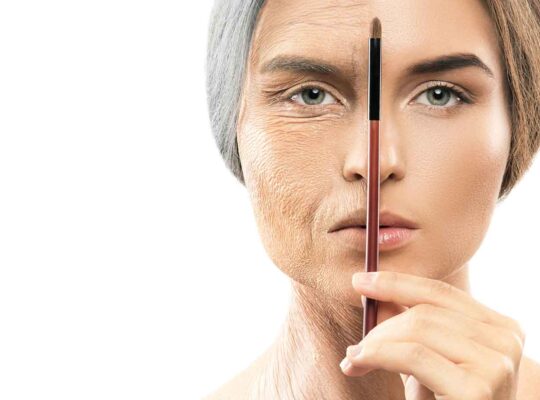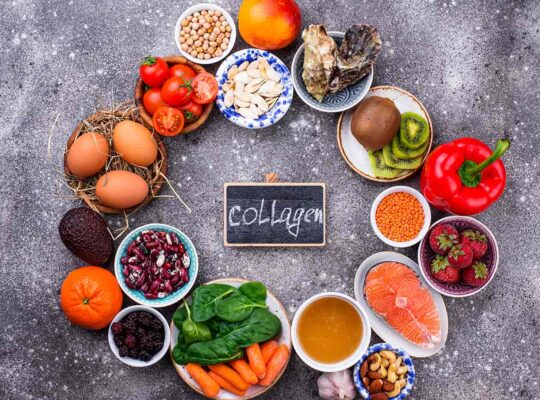The Power of Collagen: How It Supports Your Body from Skin to Joints
Ever wonder what keeps your skin smooth, your joints flexible, or your bones strong? The answer is collagen. This protein is super important in your body and does all these things and more. Recently, collagen supplements and skincare products have become really popular because people believe they can help with everything from smoother skin to stronger joints. But what exactly does collagen do, and why is it so important? In this article, we’ll explain what collagen does in your body, how it helps, and whether you should think about taking collagen supplements.
What is Collagen?
Collagen is the most common protein in your body, making up about one-third of all the protein in you. Think of collagen as the glue that holds your body together. It gives structure to your skin, bones, muscles, and even your tendons and ligaments. There are different types of collagen, with Type I, II, and III being the most common.
- Type I: Found mostly in your skin, bones, tendons, and ligaments. It’s the strongest type and helps keep everything in place.
- Type II: Found mainly in your cartilage, which is the flexible part of your joints.
- Type III: Supports the structure of muscles, organs, and arteries.
Table: Types of Collagen and Their Functions
| Type of Collagen | Where It’s Found | What It Does |
|---|---|---|
| Type I | Skin, bones, tendons, ligaments | Provides structure and strength |
| Type II | Cartilage | Cushions joints |
| Type III | Muscles, organs, arteries | Supports muscles and organs |
How Collagen Benefits the Skin
Collagen is probably best known for keeping your skin elastic (which means stretchy) and hydrated (which means full of moisture). Collagen fibers act like a scaffold for your skin, keeping it firm and smooth. But as you get older, your body starts making less collagen. This can lead to wrinkles, sagging skin, and dryness.
Some studies have shown that taking collagen supplements can help reduce signs of aging. For example, one study found that women who took a collagen supplement for 12 weeks had fewer wrinkles and better-hydrated skin compared to those who didn’t take it.
Collagen’s Role in Joint and Bone Health
Collagen isn’t just about looking good—it’s also crucial for keeping your joints and bones healthy. Collagen is a big part of the cartilage, the rubbery tissue that cushions your joints. If your body doesn’t have enough collagen, your cartilage can wear down, leading to joint pain and stiffness.
Research shows that collagen supplements can help reduce joint pain and improve movement, especially for people with osteoarthritis. For example, one study found that people who took a collagen supplement for 90 days reported less joint pain and could move more easily.
Collagen is also really important for bone health. Your bones are mostly made of collagen, which gives them their structure and strength. As you get older, and collagen production slows down, your bones can become weaker and more likely to break. Some studies suggest that taking collagen supplements can help keep your bones strong.
Collagen and Hair, Nails, and Teeth
Collagen also plays a role in keeping your hair, nails, and teeth strong. It provides the building blocks for keratin, the protein that makes up your hair and nails. This means that getting enough collagen can help keep your hair strong, reduce brittleness in your nails, and even support dental health by keeping your teeth strong.
While some people say that collagen supplements make their hair grow faster or their nails stronger, there isn’t a lot of scientific proof for this. But making sure you have enough collagen in your diet can definitely help keep your hair, nails, and teeth healthy.
Collagen and Gut Health
Collagen might also help with gut health. The amino acids (the building blocks of proteins) found in collagen, like glycine and glutamine, can help strengthen the lining of your gut and improve digestion. This is especially important for people with a condition called leaky gut syndrome, where the gut lining becomes too porous, letting toxins and bacteria into your bloodstream.
By helping to keep the gut lining strong, collagen can improve digestion and reduce symptoms of digestive disorders. While more research is needed to fully understand how collagen supports gut health, many people say it helps.

Natural Sources of Collagen
If you want to increase your collagen intake naturally, there are several foods that are rich in collagen or help your body produce more collagen:
Table: Natural Sources of Collagen
| Food | Nutritional Value |
|---|---|
| Bone Broth | Rich in collagen, amino acids, calcium, magnesium, and phosphorus |
| Fish | High in Type I collagen, omega-3 fatty acids, and protein |
| Chicken | Good source of Type I and II collagen, as well as protein, vitamin B6, and niacin |
| Eggs | While not directly containing collagen, eggs are rich in proline, an amino acid needed for collagen production |
| Citrus Fruits | High in vitamin C, which is essential for collagen synthesis in the body |
Natural Sources vs. Supplements
Eating foods rich in collagen is a great way to boost your body’s collagen levels naturally. But if you’re not getting enough from your diet alone, collagen supplements can be a handy option. These supplements are usually made from bovine (cow), porcine (pig), or marine (fish) sources and come in different forms like powders, capsules, or liquids.
Do You Need Collagen Supplements?
So, should you take collagen supplements? It depends on your personal needs. Collagen supplements can be especially helpful for older adults, athletes, or anyone dealing with joint pain or skin aging.
Pros:
- Convenient: Easy to add to your daily routine.
- Backed by Research: Some studies show benefits for skin, joints, and bones.
- Variety: Available in powders, capsules, and more.
Cons:
- Cost: Supplements can be pricey.
- Not Guaranteed: Results can vary from person to person.
- Allergies: Some people may be allergic to the ingredients in collagen supplements.
If you’re thinking about trying collagen supplements, it’s a good idea to talk to a healthcare provider first. They can help you figure out if it’s a good choice for you and make sure it’s safe.
Conclusion
Collagen is a crucial protein that plays a big role in your skin, joints, bones, and more. As you get older, your body produces less collagen, which can lead to wrinkles, joint pain, and other signs of aging. Eating foods that are rich in collagen or taking supplements can help you maintain healthy levels of this important protein.
Whether you choose to get your collagen from food or supplements, it’s a good idea to pay attention to your collagen intake to support your overall health. Just remember to check with a healthcare provider before starting any new supplement.
Frequently Asked Questions (FAQ)
1. What does collagen do for your body? Collagen helps keep your skin firm, your joints flexible, and your bones strong. It also supports healthy hair, nails, and teeth.
2. Can collagen supplements really improve your skin? Yes, some studies have shown that collagen supplements can improve skin elasticity, hydration, and reduce wrinkles.
3. What foods are high in collagen? Foods like bone broth, fish, chicken, and eggs are high in collagen or help your body produce collagen. Citrus fruits, high in vitamin C, also support collagen production.
4. Are there any side effects of taking collagen supplements? Collagen supplements are generally safe, but some people might experience stomach discomfort or allergies.
5. Is collagen good for gut health? Yes, collagen contains amino acids that can help strengthen the gut lining and improve digestion, although more research is needed.









